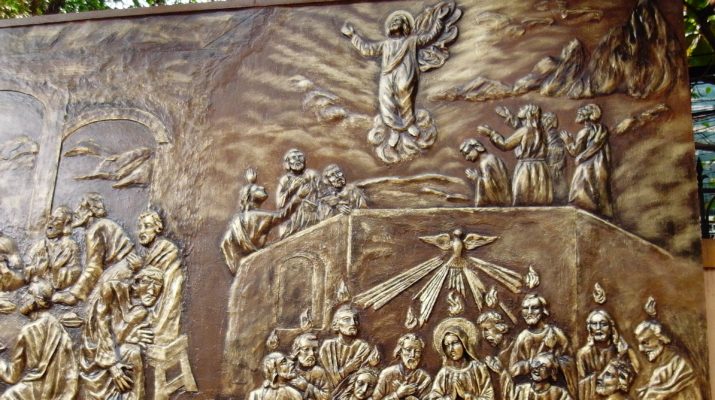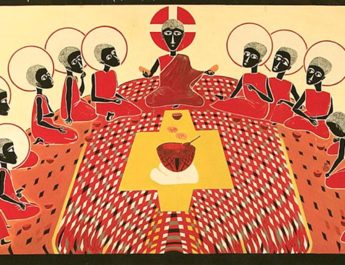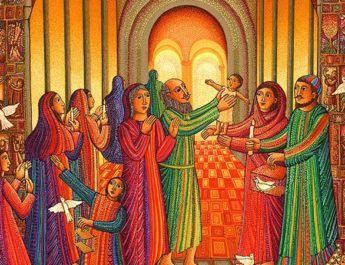Acts 1:6-14
Eastertide A26
6 So when theyA had come together, they askedB him, “Lord,C is this the timeD when you will restoreE the kingdomF to Israel?”G
A {untranslated} = men. This is truly, indeed, even, in fact. Often, it is not translated, but used to emphasize affirmation.
B “asked” = erotao. From eromai (to ask) OR from ereo (to say, tell, call, speak of). This is asking a question or making an earnest request. It is used between someone with whom the asker is close in some sense. So, they anticipate special consideration for their request.
C “Lord” = kurios. From kuros (authority, supremacy). This is a respectful address meaning master or sir. It refers to one who has control or power greater than one’s own. So, it was also applied to God and Jesus as Master or Lord.
D “time” = chronos. Time in the chronological sense, quantitative time or a duration of time.
E “restore” = apokathistemi. 8x in NT. From apo (from, away from) + kathistemi (to appint, set in order or set in place, constitute, give standing or authority, put in charge); {from kata (down, against, throughout, among) + histemi ((to stand, place, set up, establish, stand firm)}. This is to restore something to its original place or status. It can be give back, set up again or, figuratively, to restore full freedom or liberty. This word can also be used of healing – restoring full health.
F “kingdom” = basileia. From basileus (king, emperor, sovereign); probably from basis (step, hence foot; a pace); from baino (to walk, to go). This is kingdom, rule, authority, sovereignty, royalty, a realm.
G “Israel” = israel. From Hebrew Yisrael (God strives or one who strives with God; new name for Jacob and for his offspring); {from sarah (to persist, exert oneself, contend, persevere, wrestle, prevail) + el (God or god)}. This is Israel the people and the land.
7 He replied, “It is not for you to knowH the timesI or periodsJ that the Father has set by his ownK authority.L
H “know” = ginosko. This is to know, recognize, realize, perceive, learn. It is knowledge gained through personal experience
I “times” = chronos. Same as “time” in v6. See note D above.
J “periods” = kairos. This is season, opportunity, occasion. The word chronos is used for chronological time. Kairos is used for spiritually significant time – the right time or appointed time.
K “own” = idios. This is something that belongs to you or that is personal, private, apart. It indicates a stronger sense of possession than a simple possessive pronoun. This is where “idiot” comes from (denoting someone who hasn’t had formal training or education and so they rely on their own understanding).
L “authority” = exousia. From exesti (to be permitted or lawful); {from ek (out, out of) + eimi (to be, exist)}. This is power to act or weight. It especially denotes moral authority or influence. It can mean domain, liberty, freedom, capacity, mastery, right, force, or strength.
8 But you will receive powerM when the HolyN SpiritO has come upon you; and you will be my witnessesP in Jerusalem,Q in all JudeaR and Samaria,S and to the endsT of the earth.”
M “power” = dunamis. From dunamai (to be able, have power or ability). This is might, strength, physical power, efficacy, energy, and miraculous power. It is force literally or figuratively – the power of a miracle or the miracle itself.
N “Holy” = hagios. From hagnos (holy, sacred, pure ethically, ritually, or ceremonially; prepared for worship, chaste, unadulterated, pure to the core; undefiled by sin; figurative for innocent, modest, perfect). God is totally different from humanity and thus set apart. That which is consecrated to worship God (elements of worship) or to serve God (as the saints) are holy because they are now set apart for God’s purposes. Holy because important to God. This is sacred physically, pure. It can be morally blameless or ceremonially consecrated.
O “Spirit” = pneuma. From pneo (to blow, breath, breathe hard). This is wind, breath, or ghost. A breeze or a blast or air, a breath. Figuratively used for a spirit, the human soul or part of us that is rational. It is also used supernaturally for angels, demons, God, and the Holy Spirit. This is where pneumonia comes from.
P “witnesses” = martus. This is a witness whether having heard or seen something. It refers to a witness literally, judicially, or figuratively. By analogy, this is a martyr. This is also where the word “martyr” comes from.
Q “Jerusalem” = ierousalem. From Hebrew yerushalaim (probably foundation of peace); {from yarah (to throw, shoot, be stunned; to flow as water so figuratively to instruct or teach) + shalem (to make amends, to be complete or sound)}. This is Jerusalem, dwelling of peace.
R “Judea” = ioudaia. From Hebrew Yehudah (Judah, son of Jacob, his tribal descendants, a name for the southern kingdom. Literally, it means praised); probably from yadah (to throw one’s hands into the air in a gesture of praise); from yad (hand). This is Judea, which was a Roman province.
S “Samaria” = samareia. 11x in NT. From Hebrew Shomron (capital of the northern kingdom of Israel); from shamar (to keep, watch, or preserve; to guard something or to protect it as a thorny hedge protects something). This is Samaria, meaning watch station.
T “ends” = eschatos. Related to eschaton (end, last); perhaps from echo (to have, possess, hold). This is last, end, extreme, final. It is often used to discuss the end times, prophecies of the future, and the afterlife. The branch of theology focusing on all these topics is called “eschatology.”
9 When he had said this, as they were watching,U he was lifted up,V and a cloud tookW him out of their sight.
U “watching” = blepo. This is literally to see – it is primarily used in the physical sense. However, figuratively it can be seeing, which includes attention and so to watchfulness, being observant, perceiving, and acting on the visual information. It can also mean beware.
V “lifted up” = epairo. 19x in NT. From epi (on, upon, among, what is fitting) + airo (raise, take up, lift, remove). This is to lift up or raise in a literal or figurative sense. Figuratively, it could mean to exalt oneself.
W “took” = hupolambano. Related to “receive” in v8. 5x in NT. From hupo (by, under, about, subordinate to) + lambano (active acceptance/taking of what is available or what has been offered; emphasizes the choice and action of the individual). This is to take up or bear up, to receive. It can also mean to welcome or entertain. Further, it can mean to take up discussion of a topic, to suppose, or imagine.
10 While he was goingX and they were gazing upY toward heaven,Z suddenlyAA two menBB in whiteCC robes stood byDD them.
X “going” = poreuomai. From poros (ford, passageway). This is to go, travel, journey, or die. It refers to transporting things from one place to another and focuses on the personal significance of the destination.
Y “gazing up” = atenizo. 14x in NT. From a (has an intensive sense) + teino (to stretch, extend, strain). This is to gaze or look steadily at with one’s full attention and fascination.
ZZ “heaven” = ouranos. May be related to oros (mountain, hill) with the notion of height. This is the air, the sky, the atmosphere, and heaven. It is the sky that is visible and the spiritual heaven where God dwells. Heaven implies happiness, power, and eternity.
AA “suddenly” = idou. From eido (to be aware, see, know, remember, appreciate). This is see! Lo! Behold! Look! Used to express surprise and or draw attention to the statement.
BB “men” = aner. This is man, male, husband, or fellow. It can also refer to an individual.
CC “white” = leukos. Related to luke (light). This is bright, white, or brilliant.
DD “stood by” = paristemi. Related to “restore” in v6. From para (from beside, by) + histemi (see note E above). This is literally to place by stand. It can mean to present, exhibit, appear, bring, stand by, or prove. It can also mean to be ready, to assist, to yield, or to commend.
11 They said, “Men of Galilee,EE why do you stand looking up toward heaven? This Jesus,FF who has been taken up from you into heaven, will come in the same wayGG as you sawHH him go into heaven.”
EE “Galilee” = galilaios. 11x in NT. From galilaia (Galilee, the region and the sea); from Hebrew galil (cylinder, circuit, district); from galal (to roll in a literal or figurative sense, roll away, roll down, wallow, remove, trust). This is Galilean.
FF “Jesus” = iesous. From Hebrew Yehoshua (Joshua, the Lord is salvation); {from YHVH (proper name of the God of Israel; the self-existent and eternal one); {from havah (to become) or from hayah (to come to pass, become, be)} + yasha (to deliver, defend, help, preserve, rescue; properly, to be open, wide or free, which implies being safe. So, in a causative sense, this is to free someone). This is Jesus or Joshua in Greek – the Lord saves or the Lord is salvation.
GG “way” = tropos. 13x in NT. From the same as trope (turning, change, shifting); from trepo (to turn). This is turning and taking on a new direction or manner. It can refer to way, fashion, style, or character. This is where the word “trope” comes from.
HH “saw” = theaomai. From thaomai (to gaze at a spectacle; to look at or contemplate as a spectator; to interpret something in efforts to grasp its significance). This is to behold, look upon, see, contemplate, visit like a spectator. This is the root of the word “theatre.”
12 Then they returned to Jerusalem from the mount called Olivet,II which is near Jerusalem, a sabbath day’sJJ journeyKK away.
II “Olivet” = elaion. 1x in NT. From elaia (olive or olive tree; also, the Mount of Olives; sometimes used figuratively to refer to the people of God). This is olive orchard or grove. It is used specifically to refer to the Mount of Olives.
JJ “sabbath day’s” = sabbaton. From Hebrew shabbath (sabbath); from shabath (to rest, stop, repose, cease working; by implication, to celebrate). This is the sabbath. It can also be used as shorthand for a week i.e. the time between two sabbaths.
KK “journey” = hodos. This is way, road, path, or journey. It can imply progress along a route.
13 When they had entered the city, they went to the room upstairsLL where they were staying, Peter,MM and John,NN and James,OO and Andrew,PP
LL “room upstairs” = huperoon. 4x in NT. From huperoos (upper); from huper (over, above, beyond). This refers to an upper chamber on the third floor.
MM “Peter” = petros. Related to petra (large rock that is connected and or projecting like a rock, ledge, or cliff; can also be cave or stony ground). This is Peter, a stone, pebble, or boulder.
NN “John” = ioannes. From Hebrew yochanan (Johanan); from Yehochanan (“the Lord has been gracious”); {from YHVH (proper name of the God of Israel); {from havah (to become); from hayah (to be, exist, happen)} + chanan (beseech, show favor, be gracious; properly, to bend in kindness to someone with less status). This is John.
OO “James” = iakobos. From Hebrew Yaaqov (Jacob); from the same as aqeb (heel, hind part, hoof, rear guard of an army, one who lies in wait, usurper). This is James, meaning heel grabber or usurper.
PP “Andrew” = andreas. Related to “men” in v10. 13x in NT. From aner (see note BB above). This is Andrew, meaning manly.
PhilipQQ and Thomas,RR BartholomewSS and Matthew,TT James son of Alphaeus,UU
QQ “Philip” = philippos. From philos (dear, beloved, a friend, an associate; friendship with personal affection, a trusted confidante; love from personal experience with another person) + hippos (horse). This is Philip, meaning one who loves horses or is fond of horses.
RR “Thomas” = Thomas. 11x in NT. From Hebrew toam (twin). This is Thomas, meaning twin.
SS “Bartholomew” = bartholomaios. 4x in NT. From Aramaic bar (son, age); {Aramaic corresponding to ben (son literal or figurative; also, grandson, subject, nation); from banah (to build or obtain children)} + Talmay (Talmay, meaning “plowman” or “ridged”); {from the same as telem (furrow or ridge; root may mean to accumulate)}. This is Bartholomew, meaning “son of Tolmai.”
TT “Matthew” = matthaios. 5x in NT. From maththaios (Matthew); from Hebrew mattityahu (Matthew, “gift of the Lord”); {from mattanah (gift, offering of sacrifice, present, bribe); {from mattan (gift, reward, to give); from natan (to give, put, set, offer; to give literally or figuratively)} + YHVH (the holy name of the God of Israel, generally designated Lord; the self-existent and eternal one; the tetragrammaton); {from havah (to become); or from hayah (to be become, happen)}}. This is Matthew or Matthaeus, meaning “give of the Lord” or “given of the Lord.” See https://en.wiktionary.org/wiki/Matthew
UU “Alphaeus” = alphaios. 5x in NT. From Hebrew halap (to exchange, renew, traverse). This is Alphaeus, which shares a root with Clopas. It means “traverse” or “exchange.” See https://www.abarim-publications.com/Meaning/Alphaeus.html#.Xqfc48hKhPY
and SimonVV the Zealot,WW and JudasXX son of James.
VV “Simon” = simon. From Hebrew Shimon (Simon – Jacob’s son and his tribe); from shama (to hear, often implying attention and obedience). This is Simon, meaning “he who hears.”
WW “Zealot” = zelotes. 8x in NT. From zeloo (jealous, eager for, burning with zeal, deeply committed, envy); from zelos (eagerness or zeal on the one hand or rivalry and jealousy on the other; burning anger or burning love) perhaps from from zeo (to boil, be hot, ferment, bubble, boil, or glow; used figuratively for being fervent or earnest). This is zealous or a zealot – someone eagerly devoted to someone or something. This is where the word “zealot” comes from.
XX “Judas” = ioudas. From Hebrew Yehudah (Judah, son of Jacob, his tribal descendants, a name for the southern kingdom. Literally, it means praised); probably from yadah (to throw one’s hands into the air in a gesture of praise); from yad (hand). This is Judah or Judas, meaning praised.
14 All these were constantly devotingYY themselves to prayer,ZZ togetherAAA with certain women, including MaryBBB the mother of Jesus, as well as his brothers.CCC
YY “constantly devoting” = proskartereo. 10x in NT. From pros (at, to, toward, with) + kartereo (to be strong, endure; figuratively to be steadfast, to persevere, to be patient); {from kratos (strength, power, dominion; vigor in a literal or figurative sense; power that is exercised)}. This is to show strength consistently in the face of trials. It can also mean to persist, stand ready, be earnest, or attend to something.
ZZ “prayer” = proseuche. From proseuchomai (to pray or pray for, to worship or supplicate; more literally exchanging one’s own wishes for God’s); {from pros (advantageous for, at, toward) + euchomai (to wish, make a request, pray)}. This is prayer, worship, or a place where one prays.
AAA “together” = homothumadon. 11x in NT From homou (together); {from homos (the same)} + thumos (passion, wrath; actions emerging from passion or impulse) {from thuo (to rush along, breathe violently, offer sacrifice)}}. This is having one mind or a shared passion. It is people who share the same desire.
BBB “Mary” = mariam. From Hebrew Miryam (Aaron and Moses’s sister); from marah (to be contentious, rebellious, bitter, provoking, disobedient; to be or make bitter or unpleasant; figuratively, to rebel or resist; causatively to provoke). This is Miriam or Mary.
CCC “brothers” = adelphos. From a (with, community, fellowship) + delphus (womb). This is a brother in a literal or figurative sense. It is also used of another member of the Church.
Image credit: “Ascension and Pentecost” from St. Joseph Cathedral in Hanoi, Vietnam.




